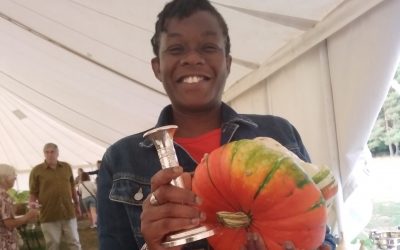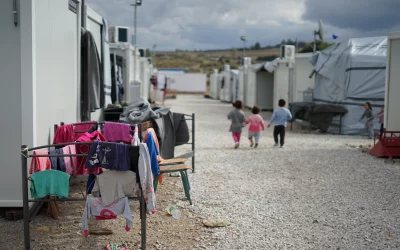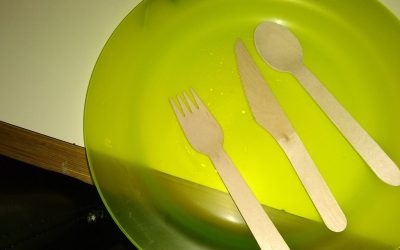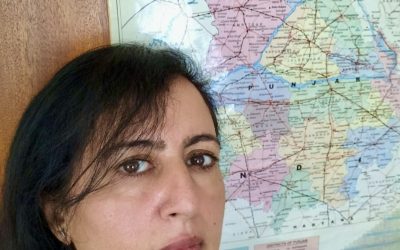The sheer desperation of migrants and cruelty of people smugglers is evident as hundreds of migrants, mainly women and children, are feared drowned after the capsizing of a decrepit overcrowded boat off the coast of Greece. Media is sharing the stories of the survivors and of the heartbroken families who had loved ones on the boat. They all have a common theme; the desire to live a better life and to be treated with dignity and respect. As we approach Refugee Week, migrant writers in the TogetherintheUK anthology, Hear Our Stories, also share their stories of desperation and cruelty.
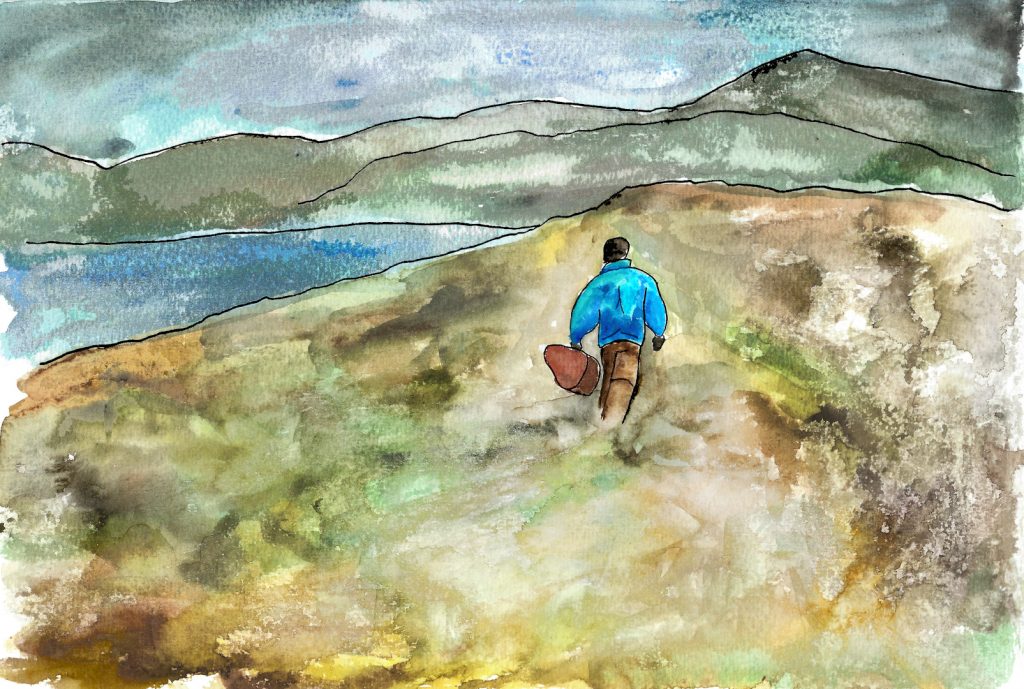
(drawing by Suey Kweon)
It seems almost glib to say yet again that the refugee crisis is at an all-time high, but the truth is that it is never-ending. In recent months, the armed conflict in Sudan has given rise to thousands of Sudanese and foreign workers fleeing the war-torn country, and the immense number of displaced people resulting from the devastating earthquake in Turkey and Syria almost overwhelmed relief agencies. While refugees from Ukraine, who thought they would only be away for a few short months, are now facing a second year, unable to return home, and refugees from Afghan and Syria are still adjusting to a new life in the UK. Sadly, there are too many humanitarian or conflict based situations causing people to flee to reference.
The desperate situations that force people to leave their homes are unimaginable to most of us, and it is sad to think that far too often, refugees must then face even more challenges as they adjust to life in a new country. With increasingly popular rhetoric suggesting that refugees are a “drain on a country”, “here to take our jobs”, and “attack our women”, refugees are victims of damaging stereotyping. It takes time and effort to communicate that refugees are ordinary people with the same wants, needs and desires as everyone else. The only difference is that they have lost everything – often arriving with just the clothes on their backs.
One of the main aims of events such as Refugee Week, 19 to 25 June 2023, is to challenge those negative attitudes towards refugees and asylum seekers. #RefugeeWeek seeks to counter stereotypes and misinformation about refugees by highlighting the stories of refugees who have successfully resettled in new communities.
Sharing the lived stories of migrants and refugees in the UK is at the heart of everything we do at TogetherintheUK (TGIUK). We strongly believe that storytelling is the most powerful way to share migrants’ experiences enabling a personal and emotional connection between the storyteller and their audiences. As our contribution to Refugee Week, and as part of their initiative “Everyone has a migration story, how will you tell yours?”, TGIUK is sharing some of the refugee tales written by migrant authors and included in the TGIUK publication, Hear Our Stories, an anthology of migrant writings.
Daniel, a young boy of just fourteen years, gave heart-breaking insight into the cruelty and desperation he faced as he fled his home country of Eritrea, heartbroken at leaving his family behind. His journey is that faced by many, many, thousands of refugees.
“Arrived in Libya, after a journey that only my God could save me from, was held for a month in a hall amongst 2,000 other migrants. One loo, little food, no shower, a drip of water. Barely enough to live. Bugs crawling in our dirt and over our bodies, what I’d give to be in a safe place. Somewhere clean.
This is what I was striving for, this was the dream!” Daniel Habte, My Eritrea
Michael aims to explain to the readers that we cannot begin to understand the turmoil or torture that refugees may have faced. A person’s behaviour, attitude or even physical appearance can disguise real pain and physical and psychological damage.
“Picture our average victim of torture. Appears confident, purposeful, and competent but masked by pain and treachery.
Beneath the surface (which is in itself another journey), you will find a broken, lost, and fragile individual on the verge of giving up.”Michael Ndoun, Survivor’s Plea
Many refugees and asylum seekers suffer mental health issues such as post-traumatic stress disorder (PTSD) and depression for many years after displacement. For some, it might be caused by any form of mental or physical torture inflicted upon them or trauma that they witnessed, the stress and dangers of the journey to a safer location or the challenges they face as they adjust to a very different life. Remembering that being safe is important, but feeling welcome and included in society and by your neighbours and community is also essential in helping a refugee adjust to their new environment. Asha wrote her poem to share the trauma some migrants face and to shed some light on the challenges that refugees face, even after they arrive in a new country.
“I relive my pain every day, every quiet moment again and again and again; it comes to haunt me. I sit up and wonder what it truly feels to be happy, to smile again without faking, to not just want to cry all the time…” Asha, PTSD, the Ripple Effect, Again and Again.
In desperation to escape their situation, refugees are vulnerable to abuse and exploitation. Knowing that many migrants are willing to take risks for a safer life, people-smuggling criminals exploit their desperation. Sadly, their journey often ends in tragic situations; suffocating in containers, drowning at sea, or being sold as part of human trafficking schemes. Yousef shared his own experience at the hands of these vile smugglers.
“We were victims of human smuggling gangs. Gangs that offer the ‘desperate’ the chance to escape but who treat us cruelly. To these people, refugees in search of salvation are just cheap commodities, treated disgustingly, smuggled in miserable means of transport, shipped alongside animals.
People must recognise the exploitation that refugees are subjected to. This is not a story; it continues day in and day out.”Yousef, Human Smuggling
Our moral conscience is temporarily shocked when we read of yet another drowning of refugees crossing the British Channel. Still, after a few days of platitudes of sorrow and demands for better treatment of refugees, our lives return to normal. Sadly, the same does not apply to the many thousands considering the same journey. It is appalling that any adult or child believes making a journey in a dingy or swimming in freezing cold water is safer than returning home. Jaimin and Kisa, two of the anthology’s Hear Our Stories authors, write eloquently about this and how often the concern is how a country will deal with refugees rather than recognising the trauma that brought them to take such desperate actions.
“Bodies wash up on our shores, on the golden sands, who warm blood the sea stole. Vessels, vessels, by which they tried to come to which they turned. Crammed beyond measure, and empty beyond.
Bodies wash up on our shores, mouths to feed, and problems of our own.
I know, I know. To ignore our own pain, is not a step in which we gain.” Jaimin, Received
“I can’t swim but still, we swim away, through choppy waters, colder than I’ve known, far away from the ivory and oil, from the machetes and men of blood.
I swim forwards, arm over tired arm, to dream to arrive, but the water is cold.” Kisa, The Channel
The theme for this year’s Refugee Week is compassion, but compassion is not just feeling sorry for someone; it is also having a strong desire to help.
Daniel spoke of the terror of his journey, but for many readers it is his simple closing words that strike the most poignant emotions – his love for his family and missing his mother.
‘Life is challenging, knowing that I still have family in Eritrea and that I haven’t see my mum in a long time‘. Daniel Habte, My Eritrea
Imagine if that was your fourteen-year-old child, sibling, or any member of your family. Refugees leave everything behind, including for so many, their families – how would we feel in the same situation? It is only by showing compassion and understanding that we make a difference. If we break down damaging stereotyping and recognise the value that so many refugees bring to our society, then we are taking the first step in making a positive change.
To show your compassion go to Refugee Week and show how you can make a difference, and if you have a migrant story to tell, then TGIUK will help you find your voice. Email Teresa Norman on tgiuk@togetherintheuk.co.uk
To read the complete stories of the extracts from Hear Our Stories and the stories and poems of many more refugees and migrants sharing their journey, you can pre-order a copy of Hear Our Stories here.
#RefugeeWeek
#CompassionIntoAction
#SimpleActs
#StoriesnotStatistics



